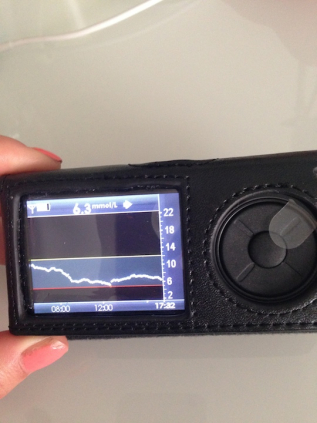CGM – should you get one?
It was finally time.
I was nervous, noticeably so.
My hands were shaking, I had a slight sweat and could only concentrate with major effort.
I was sitting at my diabetes nurse’s office, plunger in hand, plaster sitting snuggly on my stomach.
“Come on, Hanna, you’ve done this a gazillion times before”, I told myself.
And then I just did it.
I pushed the plunger and the sensor was in. It didn’t even feel worse than a normal injection (sometimes I hate the fact that I can say that.)
So, I got hooked up to my first Dexcom G4 Platinum sensor yesterday.
I have now become a bionic woman, wearing 2 medical devices/robot parts, my OmniPod insulin pump, and my Dexcom cgm. (and yes, they have names, too.)
I’ve had it on for a full 24 hours, so these are really my very first impressions! And my initial reaction is that it’s beyond amazing! The results have been very accurate (ca 1 mmol/l difference) so far, and I’m hoping it will stay that way.
What is a cgm?
A cgm is a continuous glucose monitoring system, meaning that it measures your blood glucose level in your interstitial fluid every couple of minutes.
This is done by a tiny sensor underneath your skin, which you can keep there for (officially) 1 week, but sometimes longer.
The sensor is connected to a transmitter, sending data to the receiver, on which you can see pretty graphs of what your blood glucose levels are up to.
Although the glucose levels in the interstitial fluid is a few minutes delayed from the level in your blood, it’s an awesome tool to see the trends and where you’re heading, blood glucose wise.
I love making lists for myself. And so also this time.
The pros with a cgm
– The Trends
Seeing the trends and where your blood glucose is heading is very handy. It takes a lot of the worry out of your daily care.
– Security
Hand in hand with the pro above comes the security feeling it brings. I swear I slept better last night, knowing I have something extra that has my back.
– Analysis
Being able to analyze my blood glucose better, being able to adjust my basal levels more exactly, instead of my usual guesstimation based on “yeah, that sounds good”.
The cons with a cgm
– Another device
It is, of course, yet another device connected to you at all times. The transmitter is tiny but bulky at the same time. And together with the OmniPod, I may look like a slighter version of Quasimodo in certain angles… For me it’s worth it, although there are certain items of clothing I should probably get rid of now…
– Micro management
The chance of starting to micro manage your blood glucose levels is, to a greater extent, a possibility. Seeing those dots on the screen whenever you want to may cause you to act sooner than you have to.
– Expensive
This toy definitely doesn’t come cheap. If you have an insurance policy that is ready and willing to take care of it, there’s nothing stopping you. But if you don’t, you need to think twice about getting a cgm.
And why, oh WHY, can no diabetes gear holders be at least a little nice? Why does the bag of the device have to make you feel sicker than you actually are? (Or is it just me?)
One more list: my top 5 reasons for getting a cgm:
1. I’ve lost my hypo awareness. Meaning I can’t feel when my blood glucose levels are (sometimes) dangerously low. This can of course be helped in other ways, but the other reasons made this a better choice.
2. Lately, I’ve gone extremely low every time I’m on an airplane. Weird, I know, as my pump definitely can’t be the reason for it.
3. Seeing the trends.
4. What happens in between the times I normally measure my blood glucose. I normally measure my blood glucose ca 8-10 a day, so it’s not like I’m slacking. But I have no idea when my blood sugar peaks after certain foods, for example. Without sounding too OCD:y, it’s to gain more control.
5. To have less question marks in my life. Life is full of sometimes quite pesky question marks anyway, so why add to them if there is a solution?
So far, I absolutely love my Dex (that’s his name, and no, it’s not very imaginative). I can definitely see that he’s going to be a huge help in my self care, and give me a little more peace of mind in the diabetes jungle. Dex passed the field test today, working at a cafe in town, with flying colours (and I did too, I’ve never seen a better graph! (blood glucose tests confirming this))

1st Day CGM graph – not bad!
As I see it it’s either a love or hate relationship with this thing. It has huge potential to help you a great deal in your self care, but it can also interrupt you if you already have a great regime going that works for you. But YES, you SHOULD get one! :-)
But boy, oh boy, we’ve come a long way since the insulin syringes needed to be boiled to be disinfected. Or from my very first blood glucose meter back in the late 80’s , that took several minutes to give an answer to the ever long question “where is my BS at?”
Do you have a cgm? What do you like about it? Dislike? Let me know in the comments!
Ps. I also have my first impressions written down from when I got my OmniPod about a year ago. Would you like to read that? Comment below!













One of my sisters has been diagnosed with diabetes by a doctor, and now, she’s being recommended to manage her condition better. I think I’ll buy her some waterproof Dexcom patches once she decides what kind of CGM she’ll buy. It’s interesting to know that CGMs can help her analyze what her basal levels typically are, so maybe she might like choosing a known brand that is known for its accuracy.
Hey Angela! What a lovely and caring sister you are! She’s lucky to have you. Yes, I would definitely recommend Dexcom (I’m a user of it myself, no sponsorship), as it has alarms and is pretty accurate. I hope both you and your sister have a happy and healthy new year! Hanna